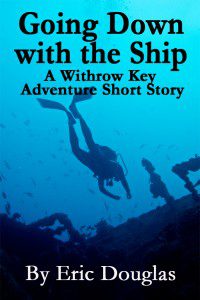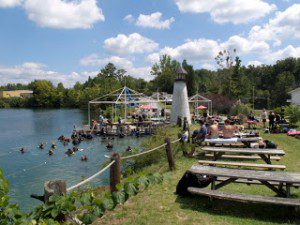One of the coolest things about being a fiction writer is that you can make up things you need to tell a story. Obviously, writers make up people all the time…or risk getting sued.
Going Black and White Underwater
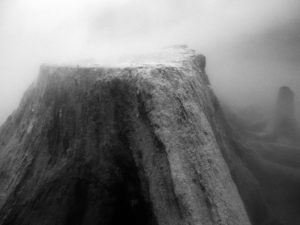 My first “real” exposure to photography was a black and white photography and darkroom class I took at Marshall. I had taken pictures before that, but never seriously. We all had those oblong cameras on our 6thgrade patrol trip to Washington DC that advanced the film with a thumb slide.
My first “real” exposure to photography was a black and white photography and darkroom class I took at Marshall. I had taken pictures before that, but never seriously. We all had those oblong cameras on our 6thgrade patrol trip to Washington DC that advanced the film with a thumb slide.
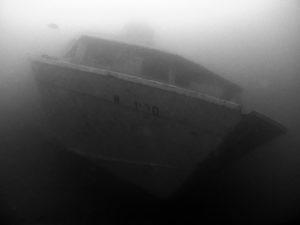 After college, I set up a darkroom in my mom’s house and continued shooting black and white for myself. I loved the control of the darkroom and the ability to make images look the way they did in my mind. I would literally spend hours in the darkroom, making prints and adjusting them and then watching them appear in the developer tray.
After college, I set up a darkroom in my mom’s house and continued shooting black and white for myself. I loved the control of the darkroom and the ability to make images look the way they did in my mind. I would literally spend hours in the darkroom, making prints and adjusting them and then watching them appear in the developer tray.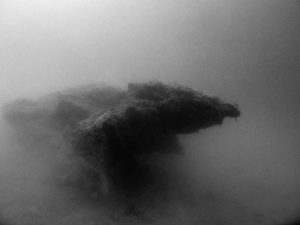 In 1998, I moved to California and mothballed my darkroom. I didn’t have the room for it, and I wasn’t shooting much at that time anyway. Later that same year, I saw a series of photographs by Ernie Brooks that blew me away. The show was made up entirely of underwater images in black and white. I was amazed by what I saw and I never forgot those photographs, but it never occurred to me to try black and white underwater photography for myself. (I admit, sometimes, I’m a little dense…)
In 1998, I moved to California and mothballed my darkroom. I didn’t have the room for it, and I wasn’t shooting much at that time anyway. Later that same year, I saw a series of photographs by Ernie Brooks that blew me away. The show was made up entirely of underwater images in black and white. I was amazed by what I saw and I never forgot those photographs, but it never occurred to me to try black and white underwater photography for myself. (I admit, sometimes, I’m a little dense…)
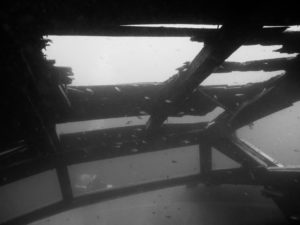 Earlier this summer, I was scuba diving with my father in Summersville Lake when I realized that everything was monotone—in this case, shades of green. Suddenly a light came on in my brain that the photographs I was making, and everything around me, would look good in black and white. And a new project was born.
Earlier this summer, I was scuba diving with my father in Summersville Lake when I realized that everything was monotone—in this case, shades of green. Suddenly a light came on in my brain that the photographs I was making, and everything around me, would look good in black and white. And a new project was born.
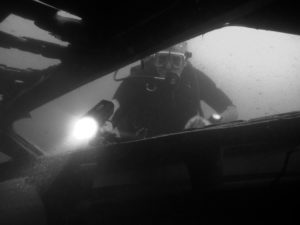 My new darkroom comes in the form of my laptop computer. Fortunately, I don’t have to spend hours waiting on these images to develop and I don’t have to deal with the chemical smells. For me, the fun thing about these photographs is that they reveal a side to the state that most West Virginians never see. I think they look spooky and mysterious.
My new darkroom comes in the form of my laptop computer. Fortunately, I don’t have to spend hours waiting on these images to develop and I don’t have to deal with the chemical smells. For me, the fun thing about these photographs is that they reveal a side to the state that most West Virginians never see. I think they look spooky and mysterious.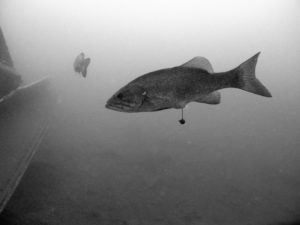 Many of my friends say they could never go scuba diving, for any number of reasons. I feel sorry for them—they will never experience what I’ve been fortunate to see—but I do understand.
Many of my friends say they could never go scuba diving, for any number of reasons. I feel sorry for them—they will never experience what I’ve been fortunate to see—but I do understand.
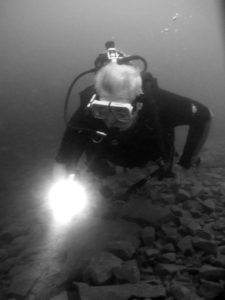 I hope sharing these photographs will shed a new light on the world beneath the surface of the water. You can find beauty in some of the strangest places. It just takes getting out there and opening your eyes.
I hope sharing these photographs will shed a new light on the world beneath the surface of the water. You can find beauty in some of the strangest places. It just takes getting out there and opening your eyes.Even in black and white.
Scuba Diving for a good cause
Yesterday, I had the pleasure of making a couple dives at Bluestone Dive Resort in Thomasville, North Carolina. It was a pleasure because I got to dive with my dad again, and I got to see a couple old friends and it was a perfect day to be outside enjoying the world. But most importantly, we were diving for a good cause.
| Divers in the water prepare for a shotgun start to hunt golfballs. |
It’s not live yet, but Janet plans to place the prizes that are still left as a silent auction on the Blue Dolphin Dive Center website. I encourage anyone reading to participate in the auction and help out a fellow diver and friend as he fights he way past cancer and the problems that come with it.
Writing historical fiction
 I have the first local book signing for my new novel Wreck of the Huron tonight and I’m giving a short presentation on the book. I’ve been thinking about what to say and it finally occurred to me that what I like best about Wreck of the Huron is the story behind the story.
I have the first local book signing for my new novel Wreck of the Huron tonight and I’m giving a short presentation on the book. I’ve been thinking about what to say and it finally occurred to me that what I like best about Wreck of the Huron is the story behind the story.
I’ve always been a history buff. I think I’ve always been blessed with the ability to “see” history in my mind. Not the history of textbooks, mind you. I’m terrible at memorizing dates. But I’ve always been able to imagine how things looked or think of historical events in terms of the people involved. I remember reading a book about the Civil War when I was about 12 or so and actually getting mad at General George McClellan. The book described all the ways in which he failed to do his job and it made me angry.
The thing I’ve learned about telling stories is that when you try talk about something huge like the Civil War, it doesn’t make sense to people. That’s where textbooks fall short. Most readers can’t relate to those events in human terms. When you’re telling a huge story, and probably especially then, you have to do it with just a few characters and make them real. Done well, historical fiction can be just as informative and educational as traditional history lessons.
The very idea of “historical fiction” makes some people groan. I know that. They think back to high school history class and how bored they were. Historical fiction doesn’t have to be boring. My last two novels (Guardian’s Keep and Wreck of the Huron) both have historical settings and backgrounds but the main part of the story takes place in present day. I like to bring readers along through the past so they can learn what happened and why as the present day characters do.
When I first heard the story of the USS Huron and her sinking in 1877, I was intrigued and knew I wanted to use it in a story, but I was stuck for a long time on how to do it. I began writing the book, but then hit a wall and had to put it away for a while. I didn’t know how I was going to tell the story of the men on board and do it justice. And then I stumbled across the transcript of the official inquest into the Huron’s sinking. I quickly realized I could tell the story of the ship by letting the men who survived do it themselves. Now that Wreck of the Huron is complete, that section is my favorite part of the book. It tells the story in human terms.
My first exposure to the story of the Huron and the circumstances of her sinking happened because of a historical highway marker beside the road and some signs explaining what had happened on a quiet stretch of beach 135 years ago. When you consider how many historical highway markers there are out there, it tells me there is no end to good stories to tell.
You just have to find the right way to tell it..
Breathing underwater for the first time
I still remember my first breath underwater. You might think I’d let that memory pass long ago. Since that first day, I’ve logged hundreds of dives and spent hundreds of hours breathing with a scuba regulator in my mouth. But that first breath was special.
I wish I could say it went smoothly, but it didn’t.
It was 1990 and I had just graduated from college with a degree in Journalism from Marshall. Like a lot of new graduates, I looked at my resume and realized just how bare it was. And, of course, I had grand aspirations of going to work for National Geographic, but that’s a different story. Anyway, I looked at my resume and wondered what I could do to beef things up a bit. I thought to myself, I could learn to fly a plane or learn to dive. I checked into both. Learning to dive seemed a lot more practical at the time.
So, that was how I found myself at the West Virginia State University (then college) pool kneeling in the shallow end with 40 or so pounds of dive gear on my back. I put my face in the water and looked around at my fellow students for a moment. We were all smiling behind our masks. And then it came time to breathe. I couldn’t do it. I choked. My throat locked up and I couldn’t inhale. I quickly rose up out of the water and spat out my regulator. After a few minutes of thinking through the process and telling myself I could actually breathe with my face in the water, I tried it again and was successful. The rest, as they say, is history. (Not really, but no one is interested in all that detail.) It has led to several books and a career in diving. Not bad for a goofy kid from West Virginia.
 Last night I got to watch a couple new divers experience scuba for the first time.
Last night I got to watch a couple new divers experience scuba for the first time.
“So how was it?” “Pretty cool!”
Local Charleston dive instructor Bob Sharpe was teaching a class and I was hanging around to get in the pool for a bit. It was fun to watch and brought back a lot of memories for me…from my own experiences as a diver and some of the students I taught along the way.
You never know if a new diver has just discovered something that will end up being a life-long passion or if they will dive a few times on their own and then move on to other experiences. It’s funny though, I often wear dive t-shirts or other logos (it makes up quite a bit of my wardrobe) and people stop me and say “Are you a diver? Me too.” Even if they haven’t been diving in years, they still identify with being a diver. And when they talk about diving you can still see that look in their eyes from their first breath. It is a look of excitement and wonder.
Tonight, I plan to spend some time in the pool with my daughters helping them learn to snorkel. Neither one of them has been all that interested in it to this point and I know better than to push it on them. Maybe next year, they will want to get scuba certified. Who knows? I won’t teach the class, but I know some very good instructors who will do it for me. I do want to be there, though, and watch that light in their eyes for the first time. I think they will say it was “pretty cool” too..
- « Previous Page
- 1
- …
- 21
- 22
- 23
- 24
- 25
- …
- 34
- Next Page »
